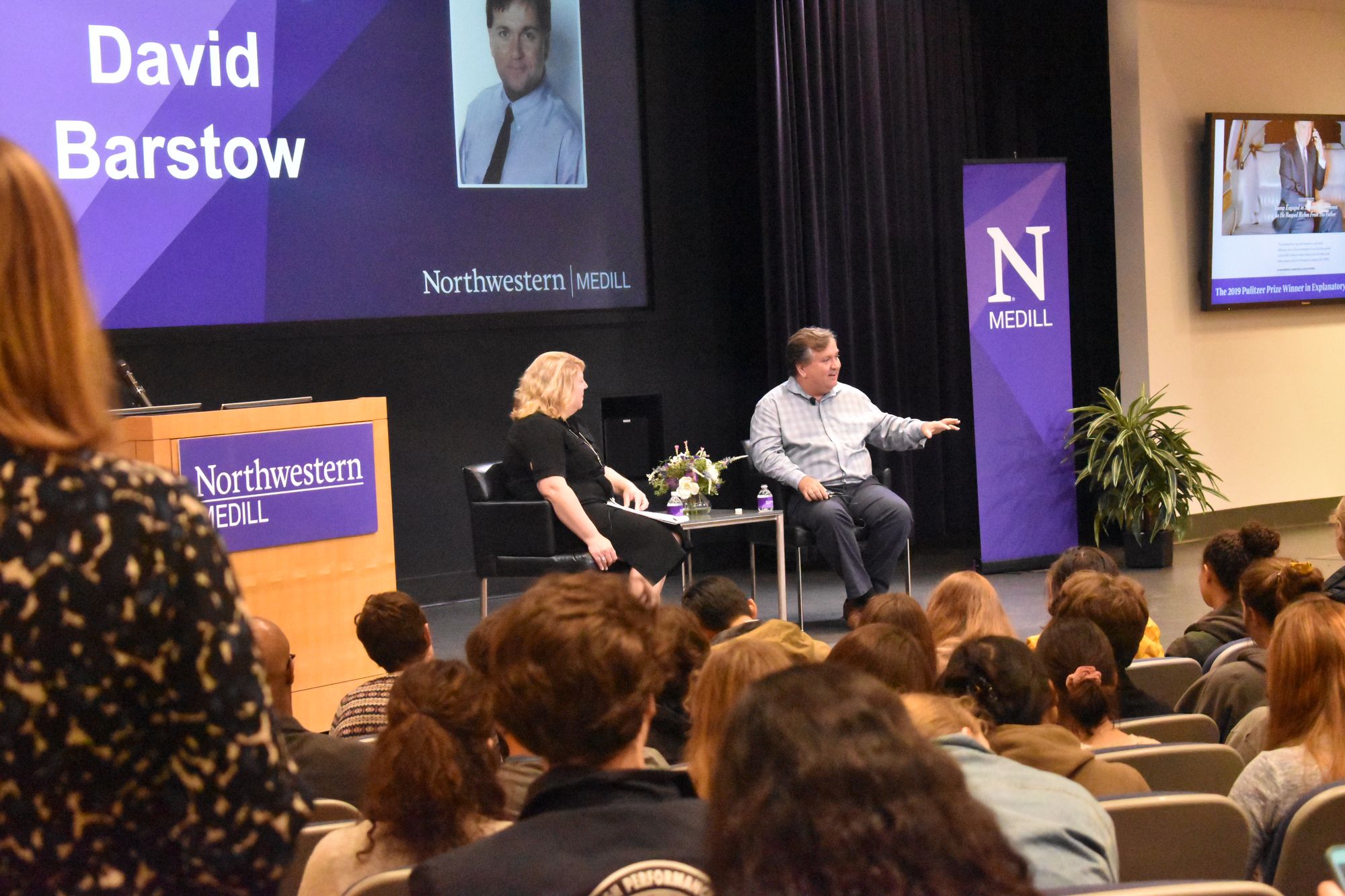
This spring, David Barstow (Medill ’86) became the first journalist to ever win four Pulitzer Prizes in reporting. Wednesday evening, he spoke at the McCormick Foundation Center about his decades-long experience as an investigative journalist, as well as the challenges facing his profession today.
Hosted by Debbie Cenziper, Director of Investigative Reporting at Medill, the discussion covered a wide range of topics, spanning from Barstow’s beginnings as a high-school soccer reporter to his perception of an ongoing battle between truth and lies.
Now a Northwestern alumnus of over 30 years, Barstow still remembers learning the fundamentals of reporting from Roger Boye, feeling intimidated by his tireless peers as a first-year and being inspired by Pulitzer Prize winner Jeff Marx (Medill ’84). He also spoke of the lasting impact of his professors and courses – like David Protess’s Law and Ethics course, which Barstow says has guided him for decades.
“I had never been the editor of my high school newspaper,” Barstow said. “I wasn’t a Cherub,” he added, prompting a roomful of laughter with a reference to Medill’s high-school journalism camp.
Barstow’s first experience in journalism came in high school, when he was irritated by the local newspaper’s tendency to cover the football team and not his soccer team. The sports editor told him that, if he wanted to see more soccer coverage, he should do it himself. So he did.
After starting his career with the Rochester Times-Union, Barstow transitioned to the St. Petersburg Times, where he was a finalist for three Pulitzers in reporting. He joined the New York Times in 1999 and, in 2004, won a Pulitzer for his coverage of workplace safety violations. He went on to win the award three more times, most recently for a series of stories on President Donald Trump’s finances.
“For a person who has won four Pulitzer Prizes to be as self-effacing and as humble and as accessible and approachable as he is, it’s pretty amazing,” said Tim Franklin, Senior Associate Dean at Medill. “That, to me, is so refreshing.”
Widely known as one of the nation’s most acclaimed journalists, Barstow talked not only of success and grand breakthroughs but also of struggles and the Fourth Estate’s shortcomings.
“I personally feel very skeptical toward the news myself,” he said, emphasizing the need for precision and substantiation in reporting.
Regarding his investigation into the president’s finances, Barstow said his team collected over 100,000 pages of documents and more than 200 tax returns and enlisted prominent tax lawyers to review their findings. Along with discovering “dubious tax schemes,” however, his investigation also uncovered a 40-year cycle of journalists misreporting facts about the sources of Trump’s empire, due to early articles that were inaccurate.
“We [as journalists] hadn’t done our jobs,” he said, citing the Times’ first major profile of Trump in the 1970s where “virtually every single word of that story was wrong.”
“One of the things you discover in journalism,” he continued, “is that the first bad reporting that occurs on a topic often infects all the reporting that follows.”
Students appreciated Barstow’s outspokenness about his investigative process and view of journalism.
“He was forthright about his experience as a journalist,” said Medill first-year Lami Zhang. “He was really down to earth, which I loved.”
Barstow also homed in on the importance of journalism in the world today.
“There’s a greater willingness in more and more parts of the world for our leaders – our political leaders and our business leaders – to just spout utter nonsense,” he said. “The outcome of that battle between the world of truth and facts and the kingdom of lies so much rides on [journalism]. Your generation absolutely needs to be at the forefront of determining the outcome of that contest,” he continued, referring to students.
He also highlighted the predominant challenges facing journalists today and expanded on growing hostility from the public.
“What really upsets me is the ‘enemy of the state’ phrase,” he said, “because if you follow the logic of the sentence … it ends in a very bad place. At The New York Times, not that many months ago, we were forced to put up big cement blocks around the entrance because we were getting so many death threats.”
Just today, Barstow pointed out, a man was sentenced to four years in prison for making repeated death threats to the Boston Globe and other publications.
“We definitely feel that in a very direct way in our day-to-day work,” he said.
Ultimately, Barstow is continuously invigorated by the work of investigative journalism and, despite having spent over 30 years in the industry, still finds himself surprised at what he uncovers.
“That sense of discovering new stuff is a wonderful feeling,” he said. “It never gets old.”
And though his front-page investigations earn record-breaking accolades and find themselves at the forefront of public discourse, Barstow emphasized that the fantastic highs are accompanied by many arduous lows.
“It’s a lot less glamorous than it looks in some of the movies,” he said. “It’s a lot more long, lonely days with boxes of dusty records. It’s not what it looks like in All the President’s Men.”
Nevertheless, Barstow’s exceptional track record and distinct message resonated with students.
“It’s just inspiring,” said first-year Max Tracey. “I’m a Medill student too, and seeing that sort of stuff really excites me for what could be ahead.”